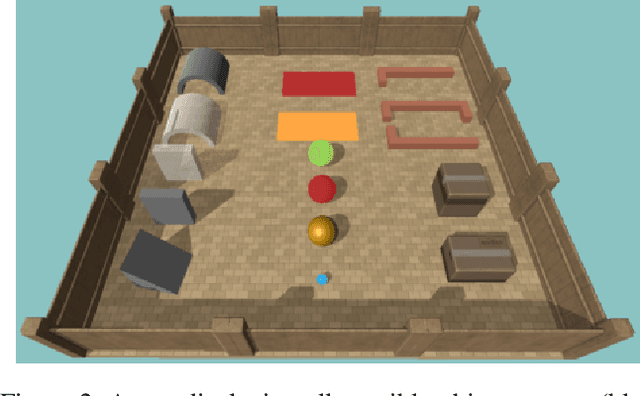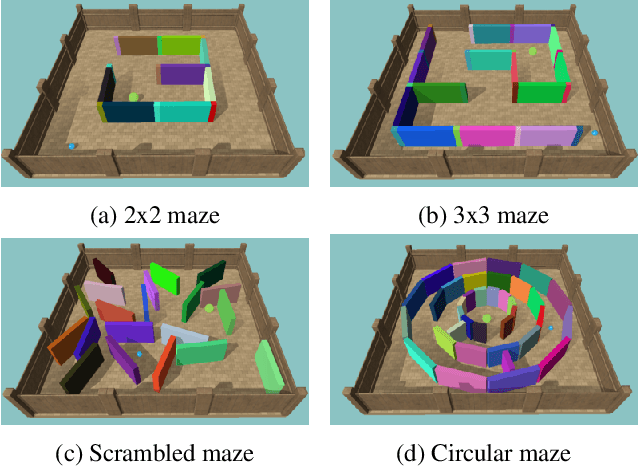Lucy Cheke
Cognitive Science-Inspired Evaluation of Core Capabilities for Object Understanding in AI
Mar 27, 2025

Abstract:One of the core components of our world models is 'intuitive physics' - an understanding of objects, space, and causality. This capability enables us to predict events, plan action and navigate environments, all of which rely on a composite sense of objecthood. Despite its importance, there is no single, unified account of objecthood, though multiple theoretical frameworks provide insights. In the first part of this paper, we present a comprehensive overview of the main theoretical frameworks in objecthood research - Gestalt psychology, enactive cognition, and developmental psychology - and identify the core capabilities each framework attributes to object understanding, as well as what functional roles they play in shaping world models in biological agents. Given the foundational role of objecthood in world modelling, understanding objecthood is also essential in AI. In the second part of the paper, we evaluate how current AI paradigms approach and test objecthood capabilities compared to those in cognitive science. We define an AI paradigm as a combination of how objecthood is conceptualised, the methods used for studying objecthood, the data utilised, and the evaluation techniques. We find that, whilst benchmarks can detect that AI systems model isolated aspects of objecthood, the benchmarks cannot detect when AI systems lack functional integration across these capabilities, not solving the objecthood challenge fully. Finally, we explore novel evaluation approaches that align with the integrated vision of objecthood outlined in this paper. These methods are promising candidates for advancing from isolated object capabilities toward general-purpose AI with genuine object understanding in real-world contexts.
General Scales Unlock AI Evaluation with Explanatory and Predictive Power
Mar 09, 2025Abstract:Ensuring safe and effective use of AI requires understanding and anticipating its performance on novel tasks, from advanced scientific challenges to transformed workplace activities. So far, benchmarking has guided progress in AI, but it has offered limited explanatory and predictive power for general-purpose AI systems, given the low transferability across diverse tasks. In this paper, we introduce general scales for AI evaluation that can explain what common AI benchmarks really measure, extract ability profiles of AI systems, and predict their performance for new task instances, in- and out-of-distribution. Our fully-automated methodology builds on 18 newly-crafted rubrics that place instance demands on general scales that do not saturate. Illustrated for 15 large language models and 63 tasks, high explanatory power is unleashed from inspecting the demand and ability profiles, bringing insights on the sensitivity and specificity exhibited by different benchmarks, and how knowledge, metacognition and reasoning are affected by model size, chain-of-thought and distillation. Surprisingly, high predictive power at the instance level becomes possible using these demand levels, providing superior estimates over black-box baseline predictors based on embeddings or finetuning, especially in out-of-distribution settings (new tasks and new benchmarks). The scales, rubrics, battery, techniques and results presented here represent a major step for AI evaluation, underpinning the reliable deployment of AI in the years ahead.
Predictable Artificial Intelligence
Oct 09, 2023



Abstract:We introduce the fundamental ideas and challenges of Predictable AI, a nascent research area that explores the ways in which we can anticipate key indicators of present and future AI ecosystems. We argue that achieving predictability is crucial for fostering trust, liability, control, alignment and safety of AI ecosystems, and thus should be prioritised over performance. While distinctive from other areas of technical and non-technical AI research, the questions, hypotheses and challenges relevant to Predictable AI were yet to be clearly described. This paper aims to elucidate them, calls for identifying paths towards AI predictability and outlines the potential impact of this emergent field.
Inferring Capabilities from Task Performance with Bayesian Triangulation
Sep 21, 2023



Abstract:As machine learning models become more general, we need to characterise them in richer, more meaningful ways. We describe a method to infer the cognitive profile of a system from diverse experimental data. To do so, we introduce measurement layouts that model how task-instance features interact with system capabilities to affect performance. These features must be triangulated in complex ways to be able to infer capabilities from non-populational data -- a challenge for traditional psychometric and inferential tools. Using the Bayesian probabilistic programming library PyMC, we infer different cognitive profiles for agents in two scenarios: 68 actual contestants in the AnimalAI Olympics and 30 synthetic agents for O-PIAAGETS, an object permanence battery. We showcase the potential for capability-oriented evaluation.
The Animal-AI Environment: Training and Testing Animal-Like Artificial Cognition
Sep 18, 2019



Abstract:Recent advances in artificial intelligence have been strongly driven by the use of game environments for training and evaluating agents. Games are often accessible and versatile, with well-defined state-transitions and goals allowing for intensive training and experimentation. However, agents trained in a particular environment are usually tested on the same or slightly varied distributions, and solutions do not necessarily imply any understanding. If we want AI systems that can model and understand their environment, we need environments that explicitly test for this. Inspired by the extensive literature on animal cognition, we present an environment that keeps all the positive elements of standard gaming environments, but is explicitly designed for the testing of animal-like artificial cognition.
 Add to Chrome
Add to Chrome Add to Firefox
Add to Firefox Add to Edge
Add to Edge